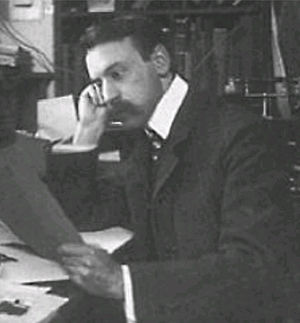Arthur Eichengrün
Arthur Eichengrün (August 13, 1867 – December 23, 1949) was a German chemist and industrialist. He is best known for his work in the development of aspirin and the invention of cellulose acetate, a crucial material in the production of photographic film and synthetic fibers.
Early Life and Education[edit | edit source]
Arthur Eichengrün was born in Aachen, Kingdom of Prussia, which is now part of Germany. He studied chemistry at the University of Aachen and later at the University of Berlin, where he earned his doctorate in 1895.
Career[edit | edit source]
Eichengrün began his career at the pharmaceutical company Bayer AG, where he worked on the synthesis of various chemical compounds. In 1897, he was involved in the development of aspirin, a widely used analgesic and anti-inflammatory drug. Although Felix Hoffmann is often credited with the discovery of aspirin, Eichengrün claimed that he was the one who directed Hoffmann's work and recognized the potential of the compound.
In addition to his work on aspirin, Eichengrün made significant contributions to the field of polymer chemistry. He invented cellulose acetate, which became an important material for the production of photographic film, synthetic fibers, and other products. He founded the Cellon-Werke company to manufacture cellulose acetate and other chemical products.
Persecution and Later Life[edit | edit source]
As a Jewish scientist, Eichengrün faced persecution during the Nazi regime. He was arrested in 1943 and interned in the Theresienstadt concentration camp until the end of World War II. After the war, he returned to his work but never fully regained his former prominence.
Legacy[edit | edit source]
Arthur Eichengrün's contributions to chemistry, particularly in the development of aspirin and cellulose acetate, have had a lasting impact on both medicine and industry. Despite the controversies surrounding the credit for aspirin's invention, his work remains highly regarded in the scientific community.
Related Pages[edit | edit source]
- Aspirin
- Felix Hoffmann
- Bayer AG
- Cellulose acetate
- Theresienstadt concentration camp
- Polymer chemistry
Categories[edit | edit source]
Search WikiMD
Ad.Tired of being Overweight? Try W8MD's physician weight loss program.
Semaglutide (Ozempic / Wegovy and Tirzepatide (Mounjaro / Zepbound) available.
Advertise on WikiMD
|
WikiMD's Wellness Encyclopedia |
| Let Food Be Thy Medicine Medicine Thy Food - Hippocrates |
Translate this page: - East Asian
中文,
日本,
한국어,
South Asian
हिन्दी,
தமிழ்,
తెలుగు,
Urdu,
ಕನ್ನಡ,
Southeast Asian
Indonesian,
Vietnamese,
Thai,
မြန်မာဘာသာ,
বাংলা
European
español,
Deutsch,
français,
Greek,
português do Brasil,
polski,
română,
русский,
Nederlands,
norsk,
svenska,
suomi,
Italian
Middle Eastern & African
عربى,
Turkish,
Persian,
Hebrew,
Afrikaans,
isiZulu,
Kiswahili,
Other
Bulgarian,
Hungarian,
Czech,
Swedish,
മലയാളം,
मराठी,
ਪੰਜਾਬੀ,
ગુજરાતી,
Portuguese,
Ukrainian
Medical Disclaimer: WikiMD is not a substitute for professional medical advice. The information on WikiMD is provided as an information resource only, may be incorrect, outdated or misleading, and is not to be used or relied on for any diagnostic or treatment purposes. Please consult your health care provider before making any healthcare decisions or for guidance about a specific medical condition. WikiMD expressly disclaims responsibility, and shall have no liability, for any damages, loss, injury, or liability whatsoever suffered as a result of your reliance on the information contained in this site. By visiting this site you agree to the foregoing terms and conditions, which may from time to time be changed or supplemented by WikiMD. If you do not agree to the foregoing terms and conditions, you should not enter or use this site. See full disclaimer.
Credits:Most images are courtesy of Wikimedia commons, and templates Wikipedia, licensed under CC BY SA or similar.
Contributors: Prab R. Tumpati, MD

